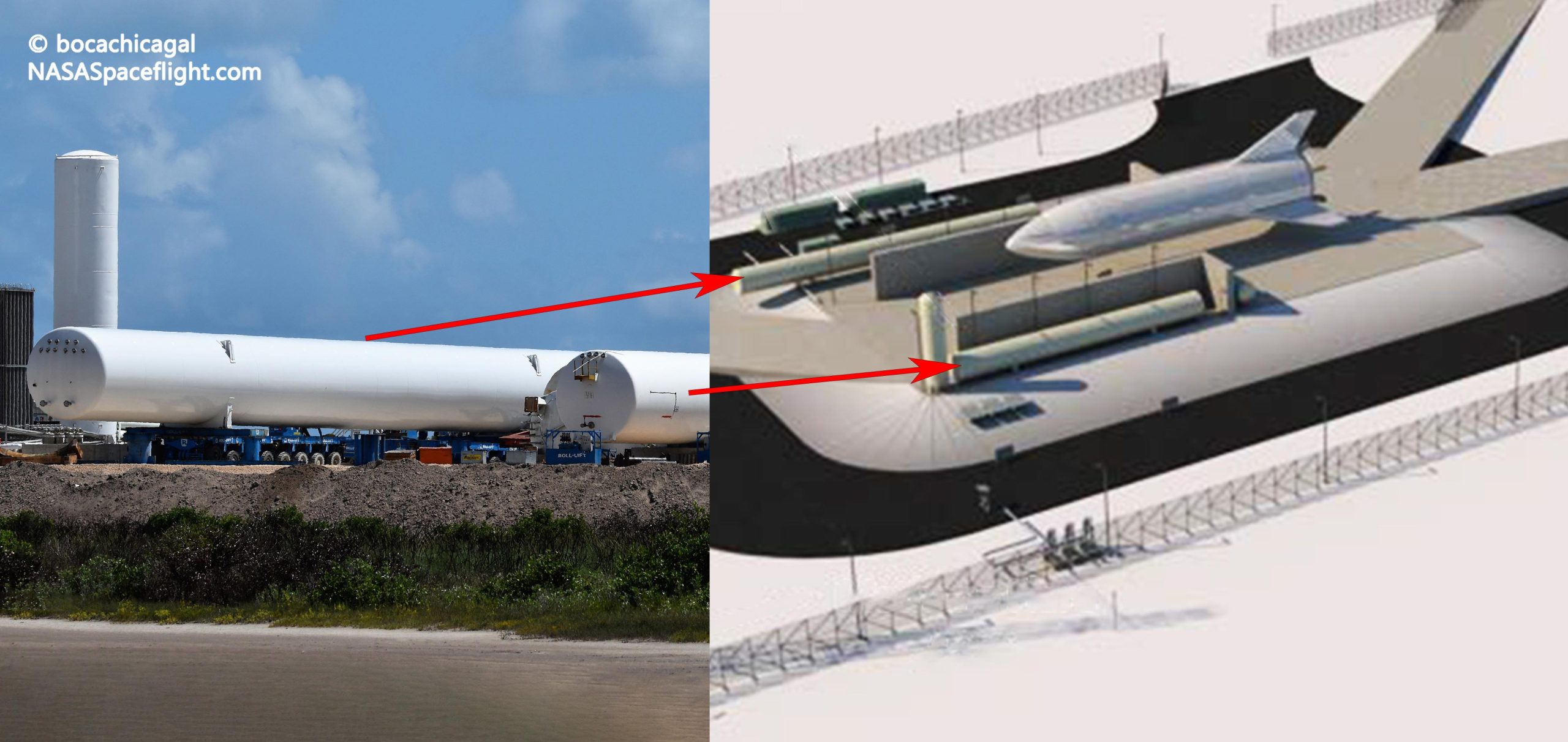
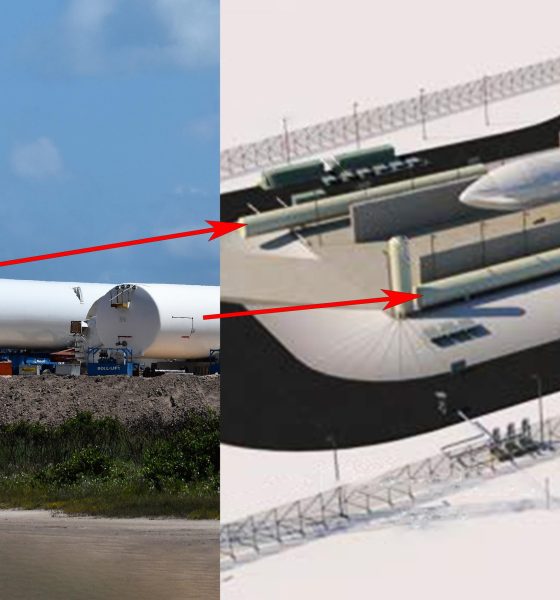
News
SpaceX begins launch pad upgrades for Starship flight tests in Texas and Florida
Beneath the buzz of Starship Mk1’s glamorous wing installation, SpaceX has begun installing new launch pad hardware meant to support the spacecraft’s first flights, several components of which have been in Boca Chica for more than a year.
Simultaneously, SpaceX broke ground on a complimentary Starship launch facility on September 21st, an add-on to the existing LC-39A pad in Cape Canaveral, Florida and the probable site of Starship’s first Super Heavy-supported orbital launch attempts.
SpaceX’s Starship-related progress at Pad 39A was noted and photographed by Julia Bergeron on September 21st during one of the hour-long bus tours offered by Kennedy Space Center’s Visitor Complex (KSCVC). SpaceX has been staging hardware at the proposed location of its Pad 39A Starship launch mount over the last ten or so days and finally broke ground (i.e. actually moved earth) on Saturday, a likely indicator that the company was waiting on an official go-ahead or construction permit.
The work at 39A could take anywhere from a few dozen weeks to 6-12 months depending on how substantial the changes are and how permanent SpaceX wants the facilities to be. For the time being, SpaceX applications show a fairly minimal series of modifications, including a concrete pad, a steel launch mount and water-cooled rocket exhaust diverter, a methane farm and associated plumbing, extensions of existing oxygen/nitrogen/helium ground systems, and a few stormwater management-related items.
At the same time, SpaceX is planning to transport its Starship Mk2 prototype – currently staged at a Cocoa, FL assembly facility – several dozen miles to Pad 39A as early as this month, although October is looking more likely. It appears that SpaceX has diverted a large portion of its Florida Starship workforce to Texas in an attempt to expedite Starship Mk1 integration, but SpaceX Cocoa has already fabricated nearly two-dozen steel rings and is likely far ahead of Boca Chica on the road to the first Super Heavy prototype. Barring calamity, Starship Mk1 is nevertheless all but guaranteed to beat Mk2 to flight.
Entering ‘Phase 2’
Back in Boca Chica, Texas, SpaceX ground engineers and technicians are working to upgrade the site’s existing launch facilities, previously used to support an extremely fast-paced campaign of Starhopper wet rehearsals, Raptor static fires, and hops. Starhopper completed its second and final flight on August 27th and the low-fidelity prototype will be retired either as a monument or a static Raptor test stand. Although the existing pad hardware was more than enough for Starhopper, Starship is much larger and has new needs that demand a few upgrades.
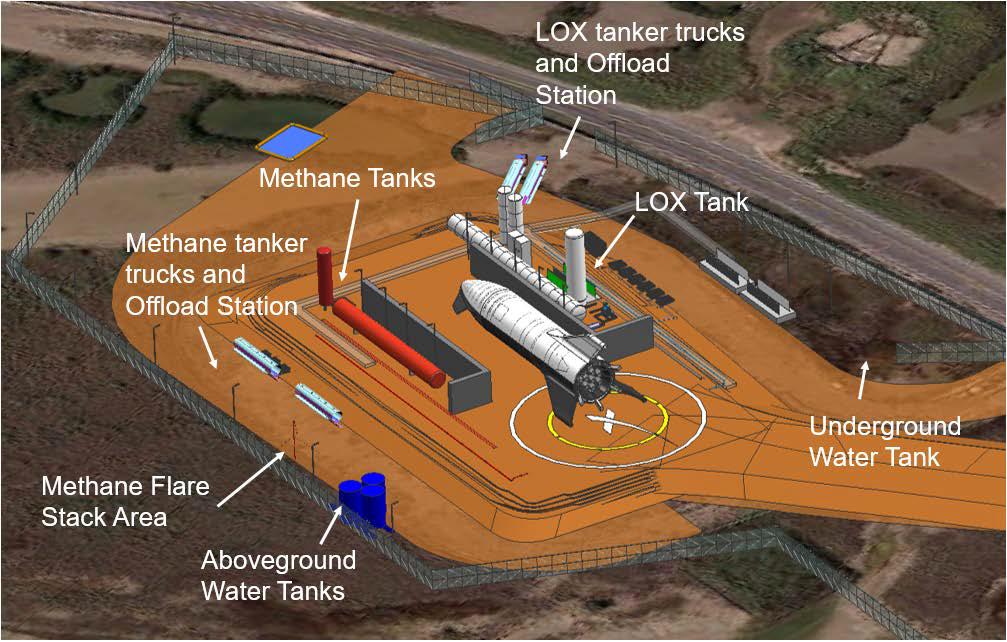
Along the lines of its proposed Phase 2 modifications, partially pictured above, SpaceX delivered two massive, new propellant tanks (one for methane, one for oxygen) on September 19th and September 22nd. Somewhat fittingly, those tanks marked the first major rocket-related SpaceX movement in Boca Chica after a long period of inactivity, and their deliveries in July and October 2018 rekindled the excitement surrounding the company’s South Texas launch site.
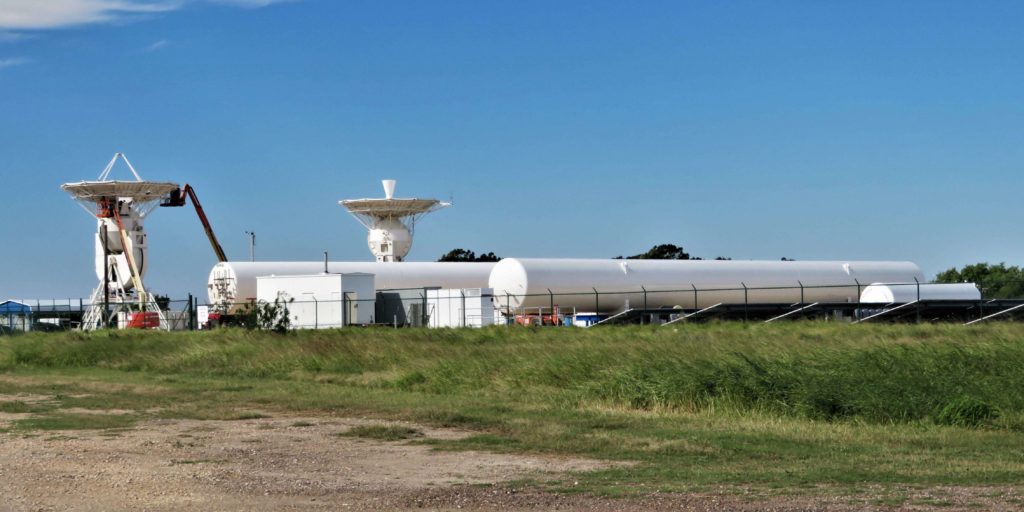
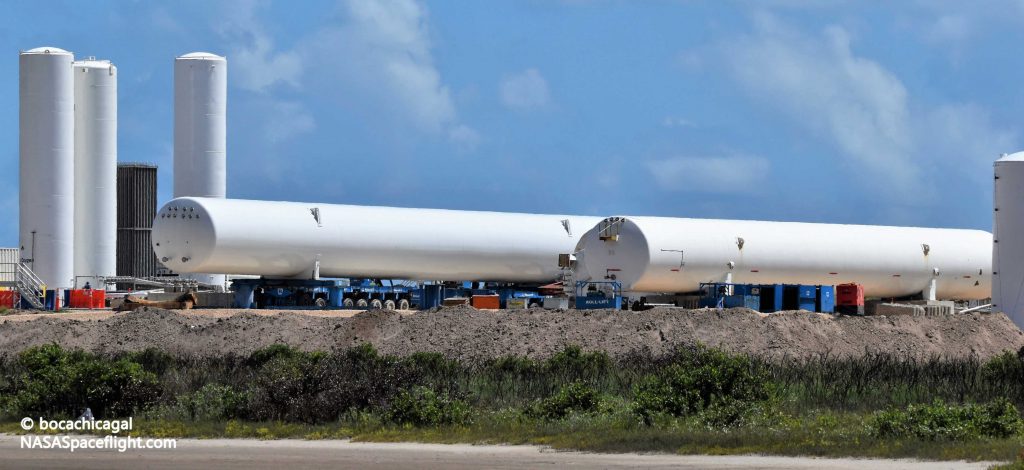
It remains to be seen whether SpaceX will revamp its current pad with a full concrete foundation and the nature of the Phase 2 pad’s launch mount and water deluge is also unclear. However, the upgrades do appear to be minimal and should take no more than a few weeks to a few months. SpaceX CEO Elon Musk wants Starship Mk1 ready for its first flight tests as early as October 2019 and the company has filed for FCC communications permits that indicate a no-earlier-than (NET) date of October 13th.
Check out Teslarati’s Marketplace! We offer Tesla accessories, including for the Tesla Cybertruck and Tesla Model 3.

News
Tesla Robotaxi ride-hailing without a Safety Monitor proves to be difficult
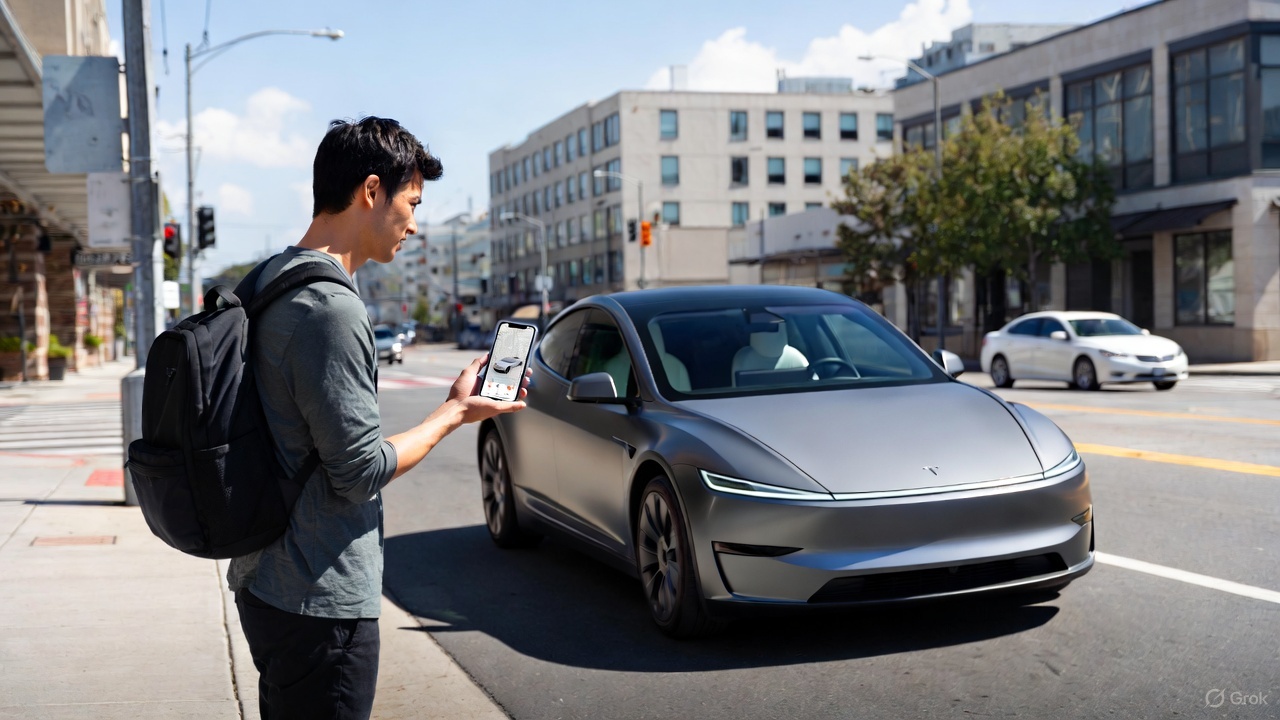
Tesla Robotaxi ride-hailing without a Safety Monitor is proving to be a difficult task, according to some riders who made the journey to Austin to attempt to ride in one of its vehicles that has zero supervision.
Last week, Tesla officially removed Safety Monitors from some — not all — of its Robotaxi vehicles in Austin, Texas, answering skeptics who said the vehicles still needed supervision to operate safely and efficiently.
BREAKING: Tesla launches public Robotaxi rides in Austin with no Safety Monitor
Tesla aimed to remove Safety Monitors before the end of 2025, and it did, but only to company employees. It made the move last week to open the rides to the public, just a couple of weeks late to its original goal, but the accomplishment was impressive, nonetheless.
However, the small number of Robotaxis that are operating without Safety Monitors has proven difficult to hail for a ride. David Moss, who has gained notoriety recently as the person who has traveled over 10,000 miles in his Tesla on Full Self-Driving v14 without any interventions, made it to Austin last week.
He has tried to get a ride in a Safety Monitor-less Robotaxi for the better part of four days, and after 38 attempts, he still has yet to grab one:
Wow just wow!
It’s 8:30PM, 29° out ice storm hailing & Tesla Robotaxi service has turned back on!
Waymo is offline & vast majority of humans are home in the storm
Ride 38 was still supervised but by far most impressive yet pic.twitter.com/1aUnJkcYm8
— David Moss (@DavidMoss) January 25, 2026
Tesla said last week that it was rolling out a controlled test of the Safety Monitor-less Robotaxis. Ashok Elluswamy, who heads the AI program at Tesla, confirmed that the company was “starting with a few unsupervised vehicles mixed in with the broader Robotaxi fleet with Safety Monitors,” and that “the ratio will increase over time.”
This is a good strategy that prioritizes safety and keeps the company’s controlled rollout at the forefront of the Robotaxi rollout.
However, it will be interesting to see how quickly the company can scale these completely monitor-less rides. It has proven to be extremely difficult to get one, but that is understandable considering only a handful of the cars in the entire Austin fleet are operating with no supervision within the vehicle.
News
Tesla gives its biggest hint that Full Self-Driving in Europe is imminent

Tesla has given its biggest hint that Full Self-Driving in Europe is imminent, as a new feature seems to show that the company is preparing for frequent border crossings.
Tesla owner and influencer BLKMDL3, also known as Zack, recently took his Tesla to the border of California and Mexico at Tijuana, and at the international crossing, Full Self-Driving showed an interesting message: “Upcoming country border — FSD (Supervised) will become unavailable.”
FSD now shows a new message when approaching an international border crossing.
Stayed engaged the whole way as we crossed the border and worked great in Mexico! pic.twitter.com/bDzyLnyq0g
— Zack (@BLKMDL3) January 26, 2026
Due to regulatory approvals, once a Tesla operating on Full Self-Driving enters a new country, it is required to comply with the laws and regulations that are applicable to that territory. Even if legal, it seems Tesla will shut off FSD temporarily, confirming it is in a location where operation is approved.
This is something that will be extremely important in Europe, as crossing borders there is like crossing states in the U.S.; it’s pretty frequent compared to life in America, Canada, and Mexico.
Tesla has been working to get FSD approved in Europe for several years, and it has been getting close to being able to offer it to owners on the continent. However, it is still working through a lot of the red tape that is necessary for European regulators to approve use of the system on their continent.
This feature seems to be one that would be extremely useful in Europe, considering the fact that crossing borders into other countries is much more frequent than here in the U.S., and would cater to an area where approvals would differ.
Tesla has been testing FSD in Spain, France, England, and other European countries, and plans to continue expanding this effort. European owners have been fighting for a very long time to utilize the functionality, but the red tape has been the biggest bottleneck in the process.
Tesla Europe builds momentum with expanding FSD demos and regional launches
Tesla operates Full Self-Driving in the United States, China, Canada, Mexico, Puerto Rico, Australia, New Zealand, and South Korea.
Elon Musk
SpaceX Starship V3 gets launch date update from Elon Musk
The first flight of Starship Version 3 and its new Raptor V3 engines could happen as early as March.
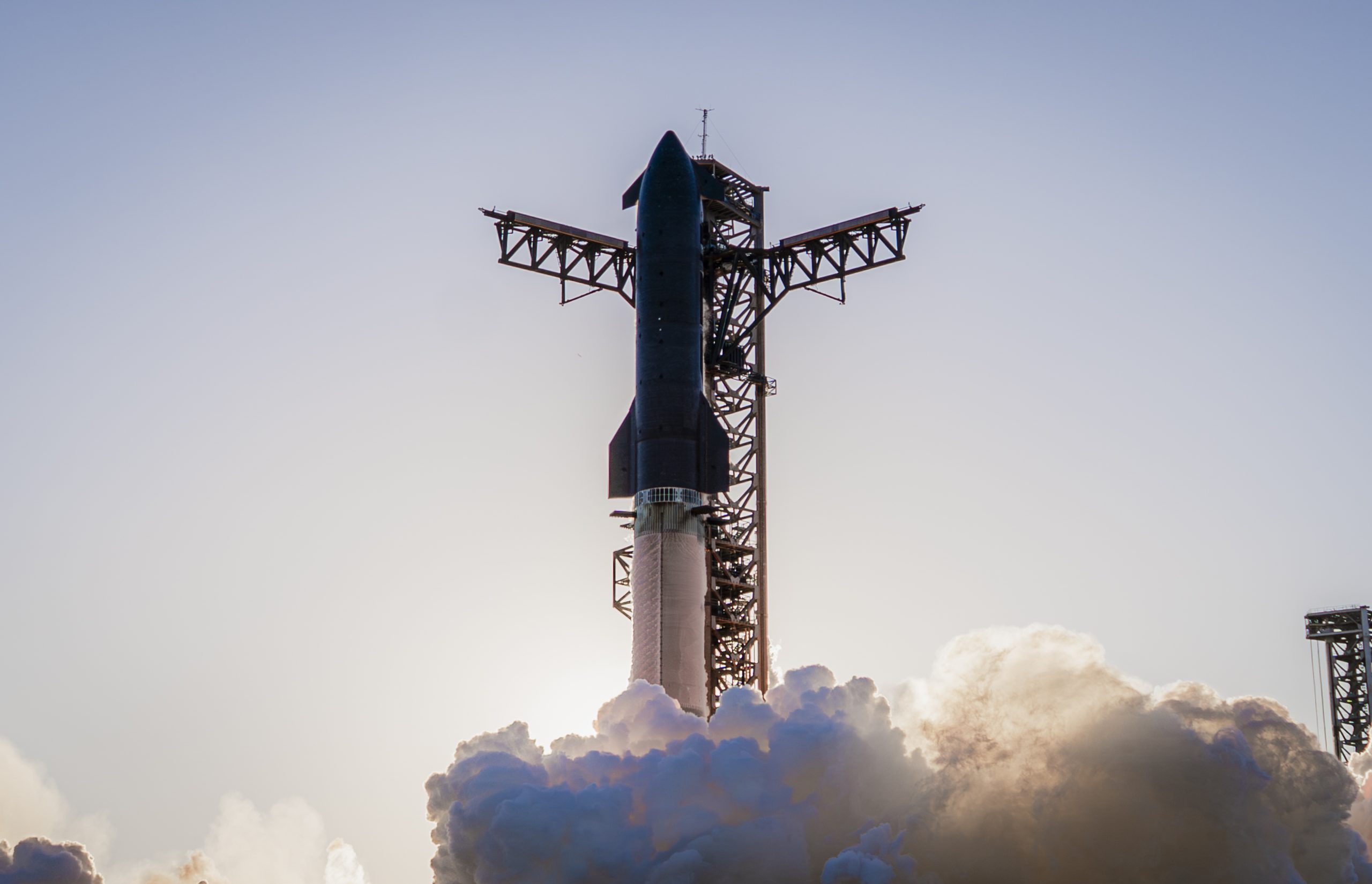
Elon Musk has announced that SpaceX’s next Starship launch, Flight 12, is expected in about six weeks. This suggests that the first flight of Starship Version 3 and its new Raptor V3 engines could happen as early as March.
In a post on X, Elon Musk stated that the next Starship launch is in six weeks. He accompanied his announcement with a photo that seemed to have been taken when Starship’s upper stage was just about to separate from the Super Heavy Booster. Musk did not state whether SpaceX will attempt to catch the Super Heavy Booster during the upcoming flight.
The upcoming flight will mark the debut of Starship V3. The upgraded design includes the new Raptor V3 engine, which is expected to have nearly twice the thrust of the original Raptor 1, at a fraction of the cost and with significantly reduced weight. The Starship V3 platform is also expected to be optimized for manufacturability.
The Starship V3 Flight 12 launch timeline comes as SpaceX pursues an aggressive development cadence for the fully reusable launch system. Previous iterations of Starship have racked up a mixed but notable string of test flights, including multiple integrated flight tests in 2025.
Interestingly enough, SpaceX has teased an aggressive timeframe for Starship V3’s first flight. Way back in late November, SpaceX noted on X that it will be aiming to launch Starship V3’s maiden flight in the first quarter of 2026. This was despite setbacks like a structural anomaly on the first V3 booster during ground testing.
“Starship’s twelfth flight test remains targeted for the first quarter of 2026,” the company wrote in its post on X.








